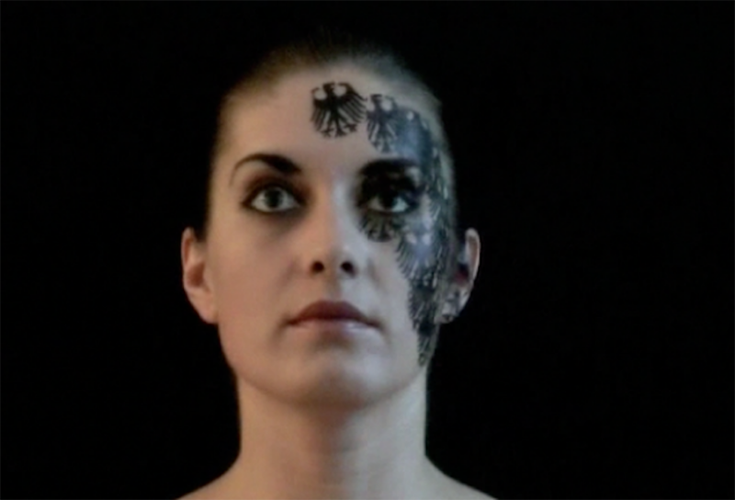*1980 in Mannheim, DE, lives and works in Karlsruhe, DE
DIFFERENT CONDITIONING
2011, video, 2 min 37 sec
A young woman, easily identifiable as the artist herself, stamps the German Federal Eagle on her face until it is entirely covered by black ink, until her face is unrecognizable. As symbol and insignia this stamp assigns a specific national identity. In the early modern era unwelcome members of the Romani people were branded so that they could be identified if they tried to cross the border again. Different Conditioning demonstrates that identity is not an anthropological constant, but is constructed through various cultural techniques and discursive practices: stamps, passports, proof of nationality, interviews, pledges, and confessions.
Our thoughts move forwards if we read the video backwards toward a particular, but absent cause, which never happened in this precise way but which we must assume. For what remains of a face, of a subject, from which all identifying features have been removed? The Italian philosopher Giorgio Agamben would call this remnant, this biopolitical substrate, “naked life”: life, namely, that has no rights whatsoever but is still completely at the mercy of the power of the state. The prisoners in Guantanamo or the migrants on the Italian coast, who later as “illegals” eke out an existence in the cities of Europe, have no rights themselves but the law has maximal rights to seize them. (Selma Alaçam)

Selma Alačama
1980., Manheima, DE, dzīvo un strādā Karlsrūē, DE
Citāda nosacītība
2011, video, 2 min 37 s
Jauna sieviete, kas viegli identificējama kā pati māksliniece, apzīmogo savu seju ar Vācijas federālo ērgli, līdz tā ir pilnībā pārklāta ar melnu tinti, un viņas seja vairs nav atpazīstama. Kā simbols un zīmotne šis zīmogs piešķir konkrētu nacionālo identitāti. “Citādā nosacītība” demonstrē, ka identitāte nav antropoloģisks konstants lielums, bet tiek veidota, izmantojot dažādus kultūras paņēmienus un diskusīvas prakses: zīmogus, pases, tautības apliecinājumus, intervijas, liecības un konfesijas.
Mūsu domas virzās uz priekšu, ja skatāmies video, atgriezeniski tuvojoties konkrētam, bet klāt neesošam cēlonim, kas nav noticis tieši šādā veidā. Jo kas tad paliek pāri no sejas, no subjekta, kuram atņemtas visas identificējošās iezīmes? Itāļu filozofs Džordžo Agambens nosauktu šo atlikumu, šo biopolitisko substrātu par “kailo dzīvību”: proti, dzīvību, kurai nav nekādu tiesību, taču kura joprojām ir pilnīgi pakļauta valsts varas žēlastībai. Gvantanamo ieslodzītajiem vai migrantiem Itālijas krastā, kuri vēlāk kā “nelegālie” knapi velk dzīvību Eiropas pilsētās, pašiem nav nekādu tiesību, bet likumam ir maksimālas tiesības tos notvert.
Selma Alačama